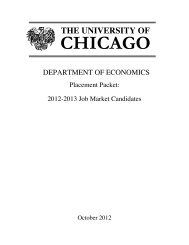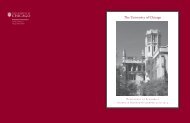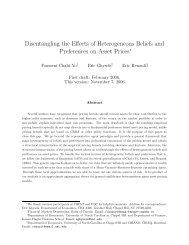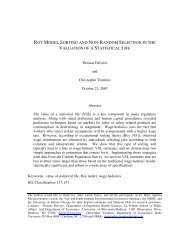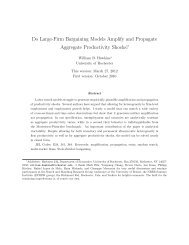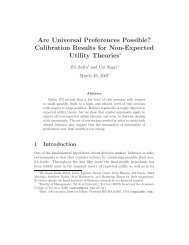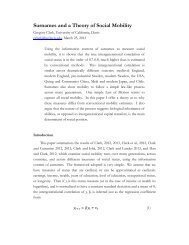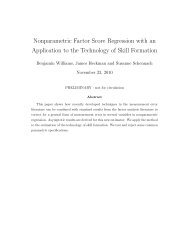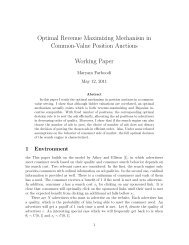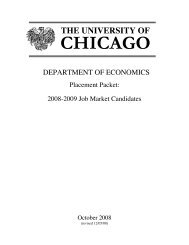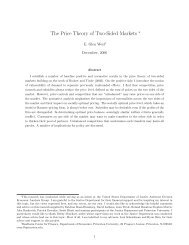Public Action and Rational Choice in Classical Greek Political Theory
Public Action and Rational Choice in Classical Greek Political Theory
Public Action and Rational Choice in Classical Greek Political Theory
Create successful ePaper yourself
Turn your PDF publications into a flip-book with our unique Google optimized e-Paper software.
Balot: A Companion to the Roman Army 9781405151436_2_c05 F<strong>in</strong>al Proof page 70 18.11.2008 7:49pm Compositor Name: PDjeapradabanCHAPTER 5<strong>Public</strong> <strong>Action</strong> <strong>and</strong> <strong>Rational</strong><strong>Choice</strong> <strong>in</strong> <strong>Classical</strong> <strong>Greek</strong><strong>Political</strong> <strong>Theory</strong>Josiah OberAs several of the chapters <strong>in</strong> this volume po<strong>in</strong>t out (especially Depew <strong>and</strong> Ludwig),Thomas Hobbes’s bleak view of humans as naturally solitary <strong>and</strong> motivated by fear ofdeath was not shared by classical <strong>Greek</strong> theorists. Yet jo<strong>in</strong>t action at scale rema<strong>in</strong>ed aproblem. How could a large <strong>and</strong> diverse ‘‘public’’ come <strong>in</strong>to be<strong>in</strong>g? How could apublic perform actions with substantial effects? These were difficult questions because<strong>Greek</strong> theorists regarded human be<strong>in</strong>gs not only as social (group-form<strong>in</strong>g) <strong>and</strong>communicative (language-us<strong>in</strong>g) animals, but also as rationally self-<strong>in</strong>terested <strong>and</strong>strategic. Individuals are capable of dist<strong>in</strong>guish<strong>in</strong>g between what is good for themselvesfrom what may be good for others, <strong>and</strong> act<strong>in</strong>g strategically on that knowledge.Recogniz<strong>in</strong>g that humans were sometimes, although not <strong>in</strong>variably, motivated byexpected utility maximization, <strong>Greek</strong> theorists sought to specify the conditions underwhich people might be expected to act more or less selfishly. 1<strong>Public</strong> <strong>Action</strong>: Incentives, Nature, <strong>and</strong> KnowledgeSocial problems that emerge because of rational self-<strong>in</strong>terest can be grouped underthe rubrics of collective action (modeled <strong>in</strong> game theory by the Prisoner’s Dilemma),common pool resources (modeled by the ‘‘tragedy of the commons’’), <strong>and</strong> crediblecommitment (modeled by ‘‘Odysseus bound to the mast’’). S<strong>in</strong>ce an action thatmaximizes expected <strong>in</strong>dividual utility may not be the most cooperative (social utilitymaximiz<strong>in</strong>g) choice, human communities must solve <strong>in</strong>centive problems: How canlikely rewards <strong>and</strong> punishments, attached to particular courses of action, be <strong>in</strong>stitutionalizedsuch that <strong>in</strong>dividuals consistently choose more cooperative courses ofaction? The solution to the complex ‘‘game’’ (that is, the situation <strong>in</strong> which no one
Balot: A Companion to the Roman Army 9781405151436_2_c05 F<strong>in</strong>al Proof page 71 18.11.2008 7:49pm Compositor Name: PDjeapradaban<strong>Public</strong> <strong>Action</strong> <strong>and</strong> <strong>Rational</strong> <strong>Choice</strong> <strong>in</strong> <strong>Greek</strong> <strong>Theory</strong> 71has a better strategic move, given his knowledge of the moves others are likely tomake <strong>in</strong> response) that emerges <strong>in</strong> an environment of social <strong>in</strong>stitutions constitutes asocial equilibrium which may be more or less stable <strong>and</strong> more or less productive.Groups with <strong>in</strong>centive systems yield<strong>in</strong>g high <strong>and</strong> stable rates of return to cooperationare, all other th<strong>in</strong>gs be<strong>in</strong>g equal, more productive. In the competitive environment ofthe <strong>Greek</strong> poleis, <strong>in</strong> which rival states competed for resources <strong>and</strong> weak competitorswere elim<strong>in</strong>ated, there was strong pressure for each polis to seek competitive advantageby devis<strong>in</strong>g good <strong>in</strong>centives. This chapter argues that <strong>Greek</strong> theorists were wellaware of the issue. Although, <strong>in</strong> contrast to early modern contract theory, strategicself-<strong>in</strong>terest was not the primary motor driv<strong>in</strong>g <strong>Greek</strong> political theory, problems of<strong>in</strong>centives <strong>and</strong> self-<strong>in</strong>terest are an important, <strong>and</strong> relatively overlooked, facet ofclassical political thought.Incentive problems come to the fore with the emergence of democracy. Asopposed to monarchy or closely held oligarchy (see Forsdyke, this volume, chapter15), where an <strong>in</strong>dividual or small corporate body can speak <strong>and</strong> act for ‘‘everyone,’’<strong>in</strong> a complex democratic state like Athens, the public is a demos: a large body ofpersons, socially diverse, <strong>and</strong> with diverse <strong>in</strong>terests <strong>and</strong> preferences. How can thatdiverse public make decisions or carry them out? Democratic decision <strong>and</strong> executionrequire <strong>in</strong>stitutional mechanisms, <strong>in</strong>clud<strong>in</strong>g vot<strong>in</strong>g <strong>and</strong> deliberation, which are potentiallyvulnerable to strategic manipulation. By allow<strong>in</strong>g diverse <strong>in</strong>dividuals tomake free choices, democracy creates space for free rid<strong>in</strong>g, <strong>and</strong> the size <strong>and</strong> diversityof the public raises questions of how that public’s commitments can be made credible.Moreover, when the polis is the ‘‘collective possession’’ of a demos, common poolresource issues loom: If each of the many ‘‘shareholders’’ of the polis chooses to takemore from the common pool than he gives back to it, the polis will collapse <strong>in</strong> a‘‘commons tragedy.’’ 2In a democracy, each member of the demos has <strong>in</strong>terests somewhat different fromthose of every other member, <strong>and</strong> no one has authority to decide whose <strong>in</strong>terestsshould be paramount. Deliberations over policy may be protracted (thus wast<strong>in</strong>gvaluable time) or cut short, leav<strong>in</strong>g people unsatisfied <strong>and</strong> prone to defect. Interestshar<strong>in</strong>gsubgroups may seek to advance particularistic agendas by tak<strong>in</strong>g strategicadvantage of vot<strong>in</strong>g <strong>and</strong> deliberations. All of this serves to push up the costs of groupaction, <strong>and</strong> thus would seem to degrade the competitive advantage of democraciesrelative to their more hierarchical rivals. Yet <strong>in</strong> classical Greece, democracies (<strong>and</strong>other republican forms of political organization) often did very well <strong>in</strong> competitiveenvironments.The puzzles of why democracies (especially Athens) did well, <strong>and</strong> how nondemocraticcommunities might do better, stimulated the development of <strong>Greek</strong> politicalthought. In the later fifth <strong>and</strong> fourth centuries, <strong>Greek</strong> political theorists ga<strong>in</strong>ed thedescriptive <strong>and</strong> analytic tools necessary to expla<strong>in</strong> public action problems. <strong>Classical</strong>theorists addressed the puzzle of how democratic communities became <strong>and</strong> rema<strong>in</strong>edproductive despite their costly processes for decision mak<strong>in</strong>g <strong>and</strong> execution. Theiranswers centered around the organization of knowledge <strong>and</strong>, with Aristotle, humannature: Democracies did better than would otherwise be expected because democraticpolitical culture <strong>and</strong> <strong>in</strong>stitutions promoted the aggregation of useful knowledge
Balot: A Companion to the Roman Army 9781405151436_2_c05 F<strong>in</strong>al Proof page 72 18.11.2008 7:49pm Compositor Name: PDjeapradaban72 Josiah Oberdispersed across a diverse citizenry. Moreover, democracies gave citizens <strong>in</strong>centives tocooperate by provid<strong>in</strong>g cooperators with access to goods they wanted, <strong>in</strong>clud<strong>in</strong>gassociation <strong>in</strong> public decisions. 3Incentive Problems <strong>in</strong> <strong>Greek</strong> Literature<strong>Greek</strong> literature had been concerned with <strong>in</strong>centive problems long before the classicalera. Accord<strong>in</strong>g to a tradition recorded <strong>in</strong> the Ehoiai (Hesiod frr. 196–204 MW; cf.Eur. IA 75 ff.), the suitors of Helen bound themselves by an oath to act <strong>in</strong> concert <strong>in</strong>the <strong>in</strong>terests of Helen’s husb<strong>and</strong> if Helen were abducted. By this act of self-b<strong>in</strong>d<strong>in</strong>g,the Achaean leaders had cut off the option of stay<strong>in</strong>g home. The oath, by provid<strong>in</strong>g acredible precommitment to a particular l<strong>in</strong>e of jo<strong>in</strong>t action, solved the coord<strong>in</strong>ationproblem (‘‘I won’t act until you do’’) necessary to beg<strong>in</strong> the Trojan War. Yet oncethey arrived at Troy, susta<strong>in</strong>ed jo<strong>in</strong>t action required that each hero have an <strong>in</strong>centiveto stay: the plot of Homer’s Iliad is driven by the <strong>in</strong>centives of fairly shared booty <strong>and</strong>honors: When Agamemnon seized Briseis, Achilles lost his <strong>in</strong>centive to cooperate.The Iliad explores the consequences of Achilles’ rationally self-<strong>in</strong>terested defection,<strong>and</strong> the difficulties attend<strong>in</strong>g Achilles’ eventual return, <strong>in</strong> the context of a culture that<strong>in</strong>cluded personal honor, friendship, <strong>and</strong> fame, as well as material goods <strong>in</strong> thecalculation of utility. The Odyssey is also much concerned with <strong>in</strong>centives: Odysseus’act of b<strong>in</strong>d<strong>in</strong>g himself to the mast <strong>in</strong> order to listen to the Sirens has become ast<strong>and</strong>ard trope <strong>in</strong> the contemporary literature on precommitment (Elster 1979,2000). Odysseus solves his problem (his desire to hear the Sirens, without los<strong>in</strong>ghis life) by elim<strong>in</strong>at<strong>in</strong>g <strong>in</strong> advance his option of act<strong>in</strong>g on the new desires that will bestimulated by the Siren’s song. His precommitment (self-b<strong>in</strong>d<strong>in</strong>g <strong>and</strong> orders to thecrew not to release him) prevented him from act<strong>in</strong>g on reformed, self-destructive,preferences.Many other works of <strong>Greek</strong> literature address aspects of <strong>in</strong>centive problems:Hesiod’s didactic poetry is <strong>in</strong>formed by a worldview that takes for granted thetendency of rational <strong>in</strong>dividuals to defect from cooperative behavior when it willadvance their own <strong>in</strong>terests. The Works <strong>and</strong> Days is motivated by Hesiod’s brotherPerseus’ defection from the cooperative order of family l<strong>and</strong> distribution <strong>and</strong> hisstrategic use of a corrupt legal order (the bribe-swallow<strong>in</strong>g basileis) to carry out hisplan. Hesiod urges avoidance of public space <strong>and</strong> great care <strong>in</strong> lend<strong>in</strong>g <strong>and</strong> borrow<strong>in</strong>g.Yet his enjoyment of trade goods (w<strong>in</strong>e from Byblos) shows that he participates<strong>in</strong> a system of exchange <strong>in</strong> which <strong>in</strong>terpersonal <strong>and</strong> <strong>in</strong>tercommunity cooperationunderwrites his way of life: Hesiod is far from a Hobbesian solitary. Aristophanes’characters tend to defect from cooperative public behavior when they perceive thatothers are not act<strong>in</strong>g cooperatively; an example is Dikaiopolis’ private market <strong>in</strong>Acharnians. The ‘‘skeptic scene’’ <strong>in</strong> Ecclesiazusae (770–806) is a po<strong>in</strong>ted case ofthe difficulty of coord<strong>in</strong>ation <strong>in</strong> the absence of credible precommitment: the skepticcharacter refuses to donate his private goods to a common store established by thenew women rulers of Athens until he sees others do<strong>in</strong>g likewise. Obviously, if no one
Balot: A Companion to the Roman Army 9781405151436_2_c05 F<strong>in</strong>al Proof page 73 18.11.2008 7:49pm Compositor Name: PDjeapradaban<strong>Public</strong> <strong>Action</strong> <strong>and</strong> <strong>Rational</strong> <strong>Choice</strong> <strong>in</strong> <strong>Greek</strong> <strong>Theory</strong> 73is will<strong>in</strong>g to go first, the women’s revolutionary scheme will not get off the ground.Pseudo-Xenophon (2.17) l<strong>in</strong>ks the problem of commitment directly to the <strong>in</strong>stitutionsof democracy, claim<strong>in</strong>g that <strong>in</strong> an oligarchy, the state’s commitments areguaranteed by the names of the rulers, whereas <strong>in</strong> a democracy, treaties are underwrittenonly by the impersonal collectivity ‘‘demos’’ – to which no personal responsibilitycan attach. Lycurgus’ case, <strong>in</strong> his law court speech Aga<strong>in</strong>st Leocrates, revolvesaround the conception of the polis as a common possession <strong>and</strong> the loom<strong>in</strong>g dangerof a commons tragedy: If the jurors acquit Leocrates, the democracy’s commitmentto sanction malefactors will be proven hollow. If <strong>and</strong> when that commitment ceases tobe credible, other <strong>in</strong>dividuals will rationally choose defection over self-sacrific<strong>in</strong>gcooperation. And thus Athens will be more vulnerable to its enemies.The two preced<strong>in</strong>g paragraphs are exempli gratia; cases of <strong>Greek</strong> authors address<strong>in</strong>g<strong>in</strong>centive problems could easily be multiplied. Of course, it is absurd to th<strong>in</strong>k thatclassical literature can be reduced to a meditation on <strong>in</strong>centives; the po<strong>in</strong>t is only that<strong>Greek</strong> authors recognized choice problems as a rich source of narrative. The rema<strong>in</strong>derof this chapter looks at how the basel<strong>in</strong>e concern with rationality <strong>and</strong> <strong>in</strong>centivesdeveloped <strong>in</strong>to sophisticated treatments of public action by Herodotus, Thucydides,Plato, <strong>and</strong> Aristotle.Herodotus on Utilities <strong>and</strong> Knowledge AggregationAristophanes, Ps-Xenophon, <strong>and</strong> Lycurgus each suggested that f<strong>in</strong>d<strong>in</strong>g the right<strong>in</strong>centives to achieve productive cooperation is difficult <strong>in</strong> democratic communities.Herodotus addresses the question of how a democratic public could come <strong>in</strong>toexistence <strong>and</strong> act effectively by contrast<strong>in</strong>g monarchies with democracies (see further,Forsdyke, chapter 15). The contrast comes through clearly <strong>in</strong> his stories of K<strong>in</strong>gCroesus of Lydia <strong>and</strong> his account of Athenian decision-mak<strong>in</strong>g before Salamis.<strong>Rational</strong>ly self-<strong>in</strong>terested choices are made by calculat<strong>in</strong>g expected utility. Thesocial problem of collective action is solved when utilities arise from <strong>and</strong> are alignedwith cooperative choices. For Herodotus, this is a matter of ethics, as emerges fromCroesus’ request that Solon name the happiest man ever to have lived. Accord<strong>in</strong>g toHerodotus’ Solon, the happiest man was Tellus of Athens, whowas from a prosperous city, <strong>and</strong> his children were good <strong>and</strong> noble. He saw children bornto them all, <strong>and</strong> all of these survived. His life was prosperous by our st<strong>and</strong>ards, <strong>and</strong> hisdeath was most glorious: when the Athenians were fight<strong>in</strong>g their neighbors <strong>in</strong> Eleusis, hecame to help, routed the enemy, <strong>and</strong> died very f<strong>in</strong>ely. The Athenians buried him at publicexpense on the spot where he fell <strong>and</strong> gave him much honor. (Hdt. 1.30.4–5, trans.Godley 1920)In the cultural environment evoked by Herodotus’ Solon, there is no conflictbetween <strong>in</strong>dividual <strong>and</strong> community <strong>in</strong>terests: Tellus gave aid to his countrymen,died <strong>in</strong> battle, <strong>and</strong> was rewarded with a grave monument. Because archaic Athenian
Balot: A Companion to the Roman Army 9781405151436_2_c05 F<strong>in</strong>al Proof page 74 18.11.2008 7:49pm Compositor Name: PDjeapradaban74 Josiah Oberethical norms def<strong>in</strong>ed posthumous public honors as a utility, Tellus’ response to acommon danger was a rational choice. The community’s offer of honors <strong>in</strong> responseto heroism could be anticipated <strong>and</strong> therefore provided an <strong>in</strong>centive to take risks<strong>in</strong> battle for a man whose posterity was already guaranteed by f<strong>in</strong>e children <strong>and</strong>gr<strong>and</strong>children. 4Along with the claim that no liv<strong>in</strong>g man can be judged happy (s<strong>in</strong>ce he may yetsuffer misfortune), ‘‘happy Tellus’’ taught a lesson about expected utility. Herodotus’fifth century readers learned that <strong>in</strong> the past, a life of optimum utility had beendef<strong>in</strong>ed by k<strong>in</strong>ship (children <strong>and</strong> gr<strong>and</strong>children), duty (fight<strong>in</strong>g the community’senemies), <strong>and</strong> moderation (adequate prosperity rather than great riches). Solon’sfollow-up story, about the Argive brothers, Cleobis <strong>and</strong> Biton, has similar import.The choices of the three men regarded by Herodotus’ Solon as happiest wererational, <strong>in</strong> their historical <strong>and</strong> cultural context, not only because each chose tomaximize his culturally-def<strong>in</strong>ed utility but also because each made his choices underconditions approach<strong>in</strong>g complete social <strong>in</strong>formation. Herodotus emphasizes that allmortals were subject to misfortune, yet Solon’s happy exemplars had been able tomake life-choices with confidence, based on their own <strong>in</strong>ductive knowledge of theunwritten rules of their societies. Maximiz<strong>in</strong>g utility through rationally chosencourses of action did not conflict with the good of their communities because theirdesires were moderate <strong>and</strong> their ambitions could be realized with<strong>in</strong> the frame ofcooperative choices <strong>and</strong> actions.The traditional morality expounded by Herodotus’ Solon, based on full social<strong>in</strong>formation <strong>and</strong> limited horizons of desire, contrasts sharply with the moral universeof the ambitious eastern monarch. Croesus’ utility function is centered on display<strong>in</strong>gluxury goods <strong>and</strong> unlimited accumulation of imperial possessions. Although his scopeof action is much greater than that of Solon’s happy men, Croesus’ ambitions are illalignedwith his choices. Unlike Tellus, Cleobis, <strong>and</strong> Biton, Croesus cannot accuratelyforetell the likely consequences of his acts because his decisions are not framed by acomprehensible system of culturally def<strong>in</strong>ed <strong>in</strong>centives <strong>and</strong> sanctions. Croesus is not ac<strong>and</strong>idate for Solon’s happiest man, not only because he is still alive, but because hisposition as an autocratic ruler makes renders it difficult for Croesus to choose well <strong>in</strong>his own or his country’s <strong>in</strong>terest (see further, Forsdyke, chapter 15).Herodotus’ fifth century Athenian readers <strong>in</strong>habited neither Croesus’ world northat of Tellus. They might look back upon ‘‘Tellus’ world’’ with nostalgia, but theirlives were lived <strong>in</strong> different circumstances <strong>and</strong> accord<strong>in</strong>g to different plans: As a resultof structural changes <strong>in</strong> fifth century Athenian society, the traditional <strong>Greek</strong> underst<strong>and</strong><strong>in</strong>gof <strong>in</strong>dividual utility came under pressure. The transformation of Athens,from ‘‘the world of Tellus’’ to ‘‘the world of Themistocles, Pericles, <strong>and</strong> Alcibiades’’ –from a relatively simple <strong>and</strong> directly comprehensible traditional society <strong>in</strong> whichrationally self-<strong>in</strong>terested <strong>and</strong> socially cooperative choice-mak<strong>in</strong>g were aligned, to acomplex <strong>and</strong> even ‘‘modern’’ society accessible only by organized knowledge – was aproduct of the emergence of Athenian democracy, the growth of an Athenian empire,<strong>and</strong> the burgeon<strong>in</strong>g of an Athens-centered exchange economy. Among the questionsHerodotus <strong>and</strong> his audience confronted was how the ‘‘modern’’ Athenian publiccame to be reconstituted, such that it was capable of act<strong>in</strong>g as a collectivity <strong>in</strong> the face
Balot: A Companion to the Roman Army 9781405151436_2_c05 F<strong>in</strong>al Proof page 75 18.11.2008 7:49pm Compositor Name: PDjeapradaban<strong>Public</strong> <strong>Action</strong> <strong>and</strong> <strong>Rational</strong> <strong>Choice</strong> <strong>in</strong> <strong>Greek</strong> <strong>Theory</strong> 75of the substantially <strong>in</strong>creased potential for rational choices to diverge from cooperativechoices. One answer was provided by contrast<strong>in</strong>g the behavior of the Atheni<strong>and</strong>emos with that of Croesus. 5A monarch can make his decisions <strong>and</strong> act upon them without directly confront<strong>in</strong>gpublic action problems. Yet a monarch faces difficulties <strong>in</strong> ga<strong>in</strong><strong>in</strong>g the right <strong>in</strong>formationfor effective decision-mak<strong>in</strong>g. Lack<strong>in</strong>g Tellus’ <strong>in</strong>ductive knowledge of a stablesocial system to frame his choices, Croesus required external sources of <strong>in</strong>formation,both to ga<strong>in</strong> more wealth <strong>and</strong> to confirm the value of his current hold<strong>in</strong>gs: ergo hisconversation with Solon <strong>and</strong> his consultation of the Delphic oracle. Upon be<strong>in</strong>g toldby the oracle that if he were to attack his eastern rival, a great empire would beoverthrown, Croesus <strong>in</strong>vaded Persian-held territory <strong>and</strong> his army was crushed <strong>in</strong> aPersian counterattack. Croesus’ failure shows that monarchical decision-mak<strong>in</strong>g,while avoid<strong>in</strong>g the costs associated with public action, may not yield competitiveadvantage <strong>in</strong> the absence of the right sort of knowledge. Croesus lost his k<strong>in</strong>gdombecause he confused oracular <strong>in</strong>formation, which could be bought, with knowledge ofhow best to act, which was not a readily purchased commodity. In his <strong>in</strong>tertw<strong>in</strong>edstories of Croesus, Solon, <strong>and</strong> Delphi, Herodotus’ connects expected utility <strong>and</strong>social choice-mak<strong>in</strong>g with knowledge-seek<strong>in</strong>g. Taken together, these stories exposethe gap between ga<strong>in</strong><strong>in</strong>g <strong>in</strong>formation <strong>and</strong> act<strong>in</strong>g appropriately, based on knowledge:The po<strong>in</strong>t is that <strong>in</strong>formation ga<strong>in</strong>ed outside a social context like that of ‘‘Tellus’world,’’ outside a context of full social <strong>in</strong>formation <strong>and</strong> <strong>in</strong>ductive knowledge,becomes valuable only if it is properly aggregated <strong>and</strong> analyzed. The question,then, is how the Athenian public could aggregate <strong>in</strong>formation <strong>and</strong> analyze it oncethe Athenians had left Tellus’ world beh<strong>in</strong>d.Among the major themes of Herodotus’ sprawl<strong>in</strong>g history is Athens’ emergence asa power substantial enough to tip the balance <strong>in</strong> the <strong>Greek</strong>s’ favor <strong>in</strong> the Greco-Persian wars of 490–78 BC. In seek<strong>in</strong>g to expla<strong>in</strong> Athenian success, Herodotus l<strong>in</strong>ks asudden growth <strong>in</strong> national military capacity with the birth of democracy by emphasiz<strong>in</strong>gthe value of isegoria: equality <strong>in</strong> respect to public speech (5.78: quoted byForsdyke, chapter 15). In expla<strong>in</strong><strong>in</strong>g why the <strong>Greek</strong>s won, Herodotus po<strong>in</strong>tedlyemphasizes Athens’ role (Hdt. 7.139). Herodotus argues that the key moment forthe <strong>Greek</strong> war effort came when the Athenians decided not to ab<strong>and</strong>on their homel<strong>and</strong><strong>and</strong> flee from Greece, even though confronted by apparently dire oracles fromDelphi. The Athenians had an extraord<strong>in</strong>arily large navy that had been built, asHerodotus expla<strong>in</strong>s (7.144.1–2), through a cooperative <strong>and</strong> forward-look<strong>in</strong>g publicdecision to treat silver revenues as a common pool resource, rather than choos<strong>in</strong>g percapita distribution. The Athenians might have chosen ab<strong>and</strong>on<strong>in</strong>g Greece over stay<strong>in</strong>gto fight. Had they done so, <strong>in</strong> Herodotus’ view, the Persians would have won.The Athenian decision-mak<strong>in</strong>g process lead<strong>in</strong>g to Salamis therefore becomes thel<strong>in</strong>chp<strong>in</strong> <strong>in</strong> the <strong>Greek</strong> victory <strong>in</strong> the Persian Wars – <strong>and</strong> equally decisive <strong>in</strong> establish<strong>in</strong>gAthens’ dom<strong>in</strong>ant place <strong>in</strong> the postwar world. In his account of Athenian decisionmak<strong>in</strong>gbefore Salamis, Herodotus shows his readers how the <strong>in</strong>ternally diverseAthenian demos acted as a public, by employ<strong>in</strong>g isegoria <strong>in</strong> choos<strong>in</strong>g, rationally <strong>and</strong>cooperatively, to fight the Persians at sea. At the heart of the process is an <strong>in</strong>stitutionalizedcapacity to aggregate <strong>and</strong> to analyze useful knowledge.
Balot: A Companion to the Roman Army 9781405151436_2_c05 F<strong>in</strong>al Proof page 76 18.11.2008 7:49pm Compositor Name: PDjeapradaban76 Josiah OberIn Herodotus’ narrative (7.140–4) the Athenians, like Croesus, first sought oracular<strong>in</strong>formation. But rather than simply act<strong>in</strong>g on that <strong>in</strong>formation, they gathered <strong>in</strong> adeliberative decision-mak<strong>in</strong>g assembly to decide what to do about it. Each citizen atthat open assembly possessed certa<strong>in</strong> social <strong>and</strong> technical <strong>in</strong>formation; the publicconstituted by the assembly potentially had access to a great deal of <strong>in</strong>formation thatwould otherwise be widely dispersed. The process of deliberat<strong>in</strong>g about the mean<strong>in</strong>gof oracular <strong>in</strong>formation was open; multiple op<strong>in</strong>ions (gnōmai pollai) were offered.Elders <strong>and</strong> experts <strong>in</strong> oracle <strong>in</strong>terpretation were consulted, but their <strong>in</strong>terpretationdid not adequately account for what many others <strong>in</strong> the assembly knew <strong>and</strong> so failedto carry the day. Eventually, Themistocles offered a policy that aligned oracular<strong>in</strong>formation with what many <strong>in</strong>dividual assemblymen knew about emergent Atheniannaval capacity. Herodotus’ account of Athenian decision-mak<strong>in</strong>g at this all-importantjuncture ignores the moment of vot<strong>in</strong>g. Instead, it directs our attention to the valueof social knowledge: the Athenian’s common conviction that the fate of the communitycould be entrusted to the thous<strong>and</strong>s of men who would row the recentlyconstructed warships. The <strong>in</strong>herently costly process of publicly deliberat<strong>in</strong>g hadthe effect of re<strong>in</strong>forc<strong>in</strong>g the Athenians sense of themselves as a public. It helped tobetter align diverse <strong>in</strong>dividual <strong>in</strong>terests with a high-risk, high-payoff public choice byaggregat<strong>in</strong>g <strong>and</strong> analyz<strong>in</strong>g both the technical <strong>and</strong> the social knowledge necessary tomake a decision that proved to be a good one. Herodotus knew that a democraticpublic would not always make decisions better than those made by an <strong>in</strong>dividual(5.97.2–3), but his narrative helped his reader to grasp how democratic decisionmak<strong>in</strong>gcould be correlated with the polis’ success.Thucydides on Innovation <strong>and</strong> Learn<strong>in</strong>gThucydides was deeply concerned with public action <strong>and</strong> especially with the problemof the free rider, that is, the defector who rationally seeks to share <strong>in</strong> the benefitsof others’ social cooperation without assum<strong>in</strong>g any of the costs. Thucydides sawthat free rid<strong>in</strong>g was likely <strong>in</strong> a large <strong>and</strong> prosperous democracy: By exp<strong>and</strong><strong>in</strong>g therange of choices available to free citizens, <strong>and</strong> by elim<strong>in</strong>at<strong>in</strong>g social sanctions typicalof <strong>in</strong>timate <strong>and</strong> traditional <strong>Greek</strong> communities, Athenian-style democracy alsoexp<strong>and</strong>ed free riders’ opportunities. The relationship between political regime <strong>and</strong>the organization of useful knowledge is, for Thucydides, <strong>in</strong>tegrally related to theproblem of collective political action. Thucydides shows his readers how Athens’dist<strong>in</strong>ctive knowledge regime helped it do well <strong>in</strong> competition with rivals. If Herodotus’account focuses our attention on public formation <strong>and</strong> knowledge aggregation,Thucydides’ analysis suggests that outst<strong>and</strong><strong>in</strong>g democratic performance was due toconjo<strong>in</strong><strong>in</strong>g productive technical <strong>in</strong>novations with a susta<strong>in</strong>ed capacity for reap<strong>in</strong>gbenefits associated with social learn<strong>in</strong>g. If <strong>in</strong>novation <strong>and</strong> learn<strong>in</strong>g were brought<strong>in</strong>to balance, the returns to social cooperation would more than make up for lossesto free riders – especially if democratic culture identified <strong>and</strong> sanctioned free rid<strong>in</strong>g<strong>and</strong> if democratic <strong>in</strong>stitutions prevented known free riders from tak<strong>in</strong>g an undeserved
Balot: A Companion to the Roman Army 9781405151436_2_c05 F<strong>in</strong>al Proof page 77 18.11.2008 7:49pm Compositor Name: PDjeapradaban<strong>Public</strong> <strong>Action</strong> <strong>and</strong> <strong>Rational</strong> <strong>Choice</strong> <strong>in</strong> <strong>Greek</strong> <strong>Theory</strong> 77share of social goods. The key problem, as he also shows, is that balanc<strong>in</strong>g <strong>in</strong>novation<strong>and</strong> learn<strong>in</strong>g is difficult.In his assessment of Pericles at 2.65, Thucydides offers a retrospective of thePeloponnesian War <strong>and</strong> emphasizes the greatness of Athenian resources on the eveof the war. Thucydides is at pa<strong>in</strong>s to show that Athens could have won: Pericles wasrightly confident that Athens could prevail by avoid<strong>in</strong>g foolish strategic errors, givenAthens’ superiority <strong>in</strong> human <strong>and</strong> material resources – resources that Thucydidesshows to be the product of reap<strong>in</strong>g the benefits of <strong>in</strong>ternal social cooperation, <strong>and</strong>re<strong>in</strong>vest<strong>in</strong>g them <strong>in</strong> an empire that enriched each <strong>in</strong>dividual Athenian (to the extentthat he cooperated with his fellows) <strong>and</strong> the Athenian state. The empire was susta<strong>in</strong>edby the rational preference of weaker states for a hegemonic state that would protectthem (<strong>in</strong> its own <strong>in</strong>terest) from pirates <strong>and</strong> other powerful states (1.7–8). Thesepo<strong>in</strong>ts are re<strong>in</strong>forced <strong>in</strong> Pericles’ two assembly speeches <strong>in</strong> Thucydides’ text (1.40–4,2.60–4), which focus on the correlation between Athenian resources <strong>and</strong> socialcohesion: on the key importance of rema<strong>in</strong><strong>in</strong>g a public rather than devolv<strong>in</strong>g <strong>in</strong>to<strong>in</strong>terest subgroups concerned only with strategic barga<strong>in</strong><strong>in</strong>g. Much of Thucydides’history recounts how Athens’ extraord<strong>in</strong>ary resources were subsequently squ<strong>and</strong>eredby <strong>in</strong>ferior post-Periclean leaders, who proved <strong>in</strong>capable of manag<strong>in</strong>g a willful demos.That failure of leadership was exacerbated, he suggests, first because the high level ofrational social cooperation that had characterized Athens <strong>in</strong> the expansive prewaryears was not fully susta<strong>in</strong>ed under the pressure of war, <strong>and</strong> second because Athens’opponents adopted Athenian habits of <strong>in</strong>novation <strong>and</strong> social learn<strong>in</strong>g. 6In Thucydides’ history, political culture <strong>and</strong> <strong>in</strong>stitutions provide the keys toexpla<strong>in</strong><strong>in</strong>g rationally cooperative social behavior. In the funeral oration (2.35–46)Pericles asserts that Athens is characterized by a culture of open access <strong>and</strong> describesAthens’ participatory decision-mak<strong>in</strong>g process. His argument bears directly on the<strong>in</strong>tegration of rational choices with useful knowledge: Rather than depend<strong>in</strong>g on ahomogeniz<strong>in</strong>g Spartan-style ideology of m<strong>and</strong>atory sameness, Athenians are diverse<strong>in</strong> their <strong>in</strong>terests <strong>and</strong> capacities <strong>and</strong> free to make choices accord<strong>in</strong>gly. Unlike thesecretive, discipl<strong>in</strong>e-obsessed Spartans, Athenians enjoy an equal opportunity to learnfrom all those public sources that render the city an ‘‘openly shared commonpossession’’ (2.39.1), as well as an equal opportunity to share the fruits of cooperation.Pericles celebrates the fact that there is no st<strong>and</strong>ard Athenian civic curriculumnor specialized <strong>in</strong>stitutions for teach<strong>in</strong>g courage; free citizens freely choose to fightwhen necessary as a result of liv<strong>in</strong>g <strong>in</strong> a free city. There are no preestablished criteriafor assum<strong>in</strong>g the role of public <strong>in</strong>novator; anyone might be capable of demonstrat<strong>in</strong>gexcellence <strong>in</strong> some doma<strong>in</strong> – by possess<strong>in</strong>g political skills <strong>and</strong> shar<strong>in</strong>g what he knows,each citizen could benefit himself <strong>and</strong> his society.The burden of Pericles’ speech is that democratic Athens is dist<strong>in</strong>ctively meritocratic,dist<strong>in</strong>ctively free <strong>and</strong> open, <strong>and</strong> therefore dist<strong>in</strong>ctively great. Pericles describesAthens as a community of responsibly self-<strong>in</strong>terested <strong>in</strong>dividuals. He asserts thatpolitically relevant knowledge is <strong>in</strong>deed widespread among Athenian citizens – evenamong those who focus primarily upon their own affairs. He expla<strong>in</strong>s the role ofmutual <strong>in</strong>struction <strong>and</strong> deliberative rhetoric <strong>in</strong> democratic decision-mak<strong>in</strong>g. Pericles’Athenians recognize that only some people will actually serve as public speakers. But
Balot: A Companion to the Roman Army 9781405151436_2_c05 F<strong>in</strong>al Proof page 78 18.11.2008 7:49pm Compositor Name: PDjeapradaban78 Josiah Oberall citizens are expected to participate <strong>in</strong> mak<strong>in</strong>g decisions as responsive members ofthe judg<strong>in</strong>g audience of voters. This means that voters are not passive recipientsof public speakers’ rhetorical performances; rather they are active judges <strong>in</strong> theirown <strong>and</strong> the public <strong>in</strong>terest, <strong>and</strong> fully capable of dismiss<strong>in</strong>g <strong>in</strong>competents. Periclesacknowledges the possibility that some may seek to free ride by shar<strong>in</strong>g <strong>in</strong> the publicgoods produced by the political activity of others: Those who do not engage <strong>in</strong> thegive <strong>and</strong> take of mutual <strong>in</strong>struction, those concerned only with their private ends, arenot just ‘‘apolitical’’ but ‘‘useless’’: contemptible <strong>and</strong> deserv<strong>in</strong>g of be<strong>in</strong>g sanctionedas such (2.40). 7Accord<strong>in</strong>g to Thucydides’ Pericles, it is a conjunction of a unique form of governmentwith a unique public culture that fosters the <strong>in</strong>tegration of public <strong>and</strong> private<strong>in</strong>terests. This <strong>in</strong> turn facilitates a unique Athenian capacity to conjo<strong>in</strong> bold <strong>and</strong>decisive action with thoughtful public deliberations. Deliberation over policybecomes a public process of teach<strong>in</strong>g <strong>and</strong> learn<strong>in</strong>g by access<strong>in</strong>g openly available<strong>in</strong>formation <strong>and</strong> judg<strong>in</strong>g reasoned arguments. Thucydides’ Pericles describes thedemocratic collectivity as a public of choice-mak<strong>in</strong>g <strong>in</strong>dividuals, each freely striv<strong>in</strong>gto improve his personal position. Pericles overtly contrasts this Athenian ‘‘publicaction based’’ underst<strong>and</strong><strong>in</strong>g of the cooperative group that emerges from an equilibriumamong the rational <strong>in</strong>dividual choices made by free agents, with the Spartans’compulsory approach to community <strong>and</strong> hostility to any expression of <strong>in</strong>dividualdifference. Pericles’ funeral speech culm<strong>in</strong>ates <strong>in</strong> his vision of Athens as an educationto its own citizen <strong>and</strong> as a model that other states might fruitfully seek to emulate.Exactly how this emulation will manage to coexist with susta<strong>in</strong>ed Athenian uniqueness,he does not say; Thucydides’ subsequent narrative shows it will be a formidabletask under the ever-chang<strong>in</strong>g conditions of total war.Plato on <strong>Rational</strong> <strong>Choice</strong> <strong>in</strong> the Ideal StateWhile Plato scorned the sources of Athenian wealth (Grg. 517a–19b), he readilyadmitted the value of material flourish<strong>in</strong>g to choice-mak<strong>in</strong>g <strong>in</strong>dividuals. Plato’sRepublic shows that he was also well aware of the close association of materialflourish<strong>in</strong>g with a community’s capacity to reap the social benefits of cooperation.The project of the Republic is the design of an ideal city by Socrates <strong>and</strong> his<strong>in</strong>terlocutors. They seek to underst<strong>and</strong> the role of justice <strong>in</strong> the <strong>in</strong>dividual soul <strong>and</strong>the community. The project beg<strong>in</strong>s with Socrates’ claim that organized communitiesorig<strong>in</strong>ally emerged because <strong>in</strong>dividuals rationally desired to ga<strong>in</strong> for themselves thematerial benefits of cooperation: Every person needs many th<strong>in</strong>gs <strong>and</strong> no one is selfsufficientlycapable of provid<strong>in</strong>g those th<strong>in</strong>gs for himself. People thus require ‘‘partners<strong>and</strong> helpers’’ if they are to live truly human lives, <strong>and</strong> they ‘‘share th<strong>in</strong>gs with oneanother, giv<strong>in</strong>g <strong>and</strong> tak<strong>in</strong>g, . . . because each believes that this is better for himself’’(369b–-c, emphasis added). To be effective, this shar<strong>in</strong>g must be systematic, <strong>and</strong> thusit requires the <strong>in</strong>stitutions of marketplace, currency, <strong>and</strong> retail trade (371c–d). Withthese premises established, <strong>and</strong> the <strong>in</strong>stitutions of rational exchange <strong>in</strong> m<strong>in</strong>d, Socrates
Balot: A Companion to the Roman Army 9781405151436_2_c05 F<strong>in</strong>al Proof page 79 18.11.2008 7:49pm Compositor Name: PDjeapradaban<strong>Public</strong> <strong>Action</strong> <strong>and</strong> <strong>Rational</strong> <strong>Choice</strong> <strong>in</strong> <strong>Greek</strong> <strong>Theory</strong> 79sketches a small <strong>in</strong>terdependent community, a modest ‘‘first polis.’’ Because thedesires of the <strong>in</strong>habitants are limited to the basics of reproduction, nourishment,<strong>and</strong> shelter, they need no elaborate systems of wealth-gett<strong>in</strong>g. Nor need they providefor the organized defense of their community, s<strong>in</strong>ce their simple possessions are<strong>in</strong>sufficient to attract the rapacious attention of outsiders. The level of social cooperationdem<strong>and</strong>ed is m<strong>in</strong>imal; few <strong>in</strong>centives or sanctions are called for, so <strong>in</strong>stitutionscan rema<strong>in</strong> vestigial.This first polis is praised by Socrates as healthy, but Glaucon berates it as fit only forpigs <strong>and</strong> dem<strong>and</strong>s a community provided with delectable food <strong>and</strong> real furniture(372a–d). After the first polis is ab<strong>and</strong>oned, the ideal state that is the subject of thethought experiment of the Republic is presumed to be composed of <strong>in</strong>dividuals withGlaucon’s more expansive conception of <strong>in</strong>dividual utility: The expansion of thedesires of the citizens to <strong>in</strong>clude luxury goods leads <strong>in</strong>exorably to an exp<strong>and</strong>ed<strong>in</strong>stitutional <strong>in</strong>frastructure to support <strong>and</strong> to defend them. As the polis grows <strong>in</strong>complexity, it must also occupy an exp<strong>and</strong>ed physical territory <strong>and</strong> ga<strong>in</strong>s a larger <strong>and</strong>more diverse population (372e–373d). The expansion of the imag<strong>in</strong>ed ideal polissharpens the issue of public action. Socrates’ <strong>in</strong>terlocutors <strong>in</strong> the Republic hadpreviously agreed upon the ‘‘Unique Aptitude Doctr<strong>in</strong>e’’ – this fundamental pr<strong>in</strong>cipleasserts that because true expertise can only be developed <strong>in</strong> a s<strong>in</strong>gle realm ofendeavor, each <strong>in</strong>dividual must engage <strong>in</strong> only a s<strong>in</strong>gle occupation. 8 Because the polisconta<strong>in</strong>s desirable luxury goods, it will excite the cupidity of outsiders <strong>and</strong> must beable to defend its members <strong>and</strong> their property from attack. The farmers, craftsmen,<strong>and</strong> traders who are the polis’ first members are forbidden by the Unitary AptitudeDoctr<strong>in</strong>e from serv<strong>in</strong>g as warriors. The ideal state’s population must therefore <strong>in</strong>cludea specialized military class, the Guardians (373e–374e).What will prevent these fierce-spirited specialists <strong>in</strong> violence, with their <strong>in</strong>ternalmonopoly of organized force, from act<strong>in</strong>g violently toward one another, thus catapult<strong>in</strong>gthe polis <strong>in</strong>to civil war, <strong>and</strong> from cooperat<strong>in</strong>g with one another <strong>in</strong> forciblyseiz<strong>in</strong>g the goods of the unarmed produc<strong>in</strong>g classes, thus <strong>in</strong>stitutionaliz<strong>in</strong>g piracy(375b–c, 416a–c)? Absent the right sanctions <strong>and</strong> <strong>in</strong>centives, Plato assumes that themembers of the military class will choose, like Homer’s Agamemnon or the possessorof the famous <strong>in</strong>visibility-produc<strong>in</strong>g ‘‘r<strong>in</strong>g of Gyges’’ (359c–360d), to maximize theirown utility by tak<strong>in</strong>g the goods of others. There is no ‘‘human nature based’’ altruism(<strong>in</strong>herent concern for others’ <strong>in</strong>terests) built <strong>in</strong>to the foundation of Plato’s ideal state;it faces the <strong>in</strong>centive problems confronted by every complex society.The ultimate goal of the dialogue is to demonstrate the utility of justice as an end <strong>in</strong>itself, that is, that actually be<strong>in</strong>g just (which <strong>in</strong>cludes not seiz<strong>in</strong>g the goods of otherseven if there is no chance of be<strong>in</strong>g caught) is more beneficial to the <strong>in</strong>dividual (i.e.maximizes his true utility) than is act<strong>in</strong>g unjustly (by maximiz<strong>in</strong>g apparent utility)while appear<strong>in</strong>g to be just. Yet the long dialogue also shows that genu<strong>in</strong>ely grasp<strong>in</strong>gthe true utility of justice is a difficult undertak<strong>in</strong>g – perhaps achievable only by a veryfew specially talented <strong>in</strong>dividuals who have completed a long <strong>and</strong> rigorous philosophicaleducation. Given Plato’s theory of knowledge, it is not open for him to resort tothe democratic forms of knowledge aggregation <strong>and</strong> <strong>in</strong>novation discussed by Herodotus<strong>and</strong> Thucydides. Plato’s solution is to resort to the sort of strong ideology
Balot: A Companion to the Roman Army 9781405151436_2_c05 F<strong>in</strong>al Proof page 80 18.11.2008 7:49pm Compositor Name: PDjeapradaban80 Josiah Oberthat Thucydides’ Pericles had proudly rejected <strong>and</strong> to a highly specialized form ofmonarchy that elides the problem exposed by Croesus’ analytic failure <strong>and</strong> consequent<strong>in</strong>capacity to fulfill his wants.The problem is that the unarmed members of Callipolis own private property, butthey will have no <strong>in</strong>centive to develop that property <strong>in</strong> economically productive waysif it is subject to arbitrary seizure by the Guardians. Plato recognized that, <strong>in</strong> theabsence of secure property rights on the part of the unmilitarized classes, the societywill not produce substantial returns to social cooperation <strong>and</strong> will fail. That recognitiondem<strong>and</strong>s specialized <strong>in</strong>stitutions: an elaborate system of education for theGuardians, <strong>and</strong> ideological <strong>in</strong>doctr<strong>in</strong>ation for all citizens. The Guardians are tra<strong>in</strong>edfrom childhood to treat productive <strong>in</strong>siders as friends, rapacious outsiders as enemies.Each Guardian’s acquisitive tendencies <strong>and</strong> Tellus-like concern with posterity are,moreover, f<strong>in</strong>essed by communal ownership of property, <strong>in</strong>clud<strong>in</strong>g wives <strong>and</strong> children.Specialized education <strong>and</strong> communal property <strong>in</strong> turn provide the spr<strong>in</strong>gboardfor develop<strong>in</strong>g the conjo<strong>in</strong>ed moral <strong>and</strong> metaphysical argument of the dialogue.Solv<strong>in</strong>g the public action problems that necessarily arise with the ab<strong>and</strong>onment ofthe modest ‘‘first polis’’ eventually pays out <strong>in</strong> the theory of Forms, <strong>and</strong> the rule ofphilosopher-k<strong>in</strong>gs who have apprehended the Form of the Good. Th<strong>in</strong>k<strong>in</strong>g aboutrational choice <strong>and</strong> public action segues naturally to Plato’s highly dist<strong>in</strong>ctive conjunctionof politics, metaphysics, <strong>and</strong> epistemology.Aristotle’s <strong>Rational</strong> <strong>Political</strong> AnimalsLike Plato, Aristotle was concerned with the emergence of communities, the challengeof cooperation, <strong>and</strong> the tendency of communities to devolve <strong>in</strong>to mistrustful factionseach strategically seek<strong>in</strong>g its own partisan advantage. Aristotle’s Politics book 1expla<strong>in</strong>s the emergence of the polis as a natural phenomenon (see further, Depew,this volume, chapter 26). In mov<strong>in</strong>g from the choice-mak<strong>in</strong>g <strong>in</strong>dividual to the complexpolitical community, Aristotle describes series of developmental steps: First isthe family as a natural unit for biological reproduction: the basel<strong>in</strong>e Tellus-likehuman concern for posterity makes the family a rational as well as natural unit. Nextcomes the village, as families choose to jo<strong>in</strong> forces <strong>in</strong> order to ga<strong>in</strong> two basic goods:better security aga<strong>in</strong>st hostile natural forces <strong>and</strong> the conditions of justice. By conditionsof justice, Aristotle means the benefits of social cooperation: Aristotle’s twoprimary def<strong>in</strong>itions of justice <strong>in</strong> the Politics are ‘‘act<strong>in</strong>g <strong>in</strong> the common <strong>in</strong>terest’’<strong>and</strong> ‘‘act<strong>in</strong>g fairly <strong>in</strong> respect to the distribution of goods.’’ Yet, like the simple ‘‘firstpolis’’ <strong>in</strong> Plato’s Republic, the Aristotelian village proves unable to secure forits residents material goods adequate to assure their autarkic existence as an <strong>in</strong>dependentcommunity. The f<strong>in</strong>al developmental stage is the polis, which conjo<strong>in</strong>s villages<strong>in</strong>to a political whole. Aristotle’s natural polis represents balances of extremes of scale:It is the smallest community capable of ga<strong>in</strong><strong>in</strong>g autarky <strong>and</strong> the largest communitycapable of ma<strong>in</strong>ta<strong>in</strong><strong>in</strong>g an adequate level of mutual moral knowledge amongits citizens.
Balot: A Companion to the Roman Army 9781405151436_2_c05 F<strong>in</strong>al Proof page 81 18.11.2008 7:49pm Compositor Name: PDjeapradaban<strong>Public</strong> <strong>Action</strong> <strong>and</strong> <strong>Rational</strong> <strong>Choice</strong> <strong>in</strong> <strong>Greek</strong> <strong>Theory</strong> 81These considerations lead directly to Aristotle’s famous claim that humans arepolitical animals. As David Depew’s chapter demonstrates, the dist<strong>in</strong>ctive feature ofAristotle’s argument is its naturalism: Humans are, for Aristotle, characterized by anatural tendency to live <strong>in</strong> groups. Moreover, humans are among the ‘‘political’’subset of group-dwell<strong>in</strong>g animals – that is to say creatures that, by their nature, areprone to work cooperatively toward common ends. This active work for the good ofthe whole is <strong>in</strong> contrast to the passive advantages attributable to basel<strong>in</strong>e coord<strong>in</strong>ation(e.g. better chances of notic<strong>in</strong>g the presence of predators) experienced by apoliticalherd animals, like school<strong>in</strong>g fish. Aristotle recognizes that humans are not the onlyanimals whose sociability leads them to act cooperatively <strong>in</strong> seek<strong>in</strong>g common ends,but as group members, humans act somewhat differently from other political animals(such as bees), <strong>in</strong>ter alia because humans can identify <strong>in</strong>dividual as well as collective<strong>in</strong>terests. Humans are, accord<strong>in</strong>g to Aristotle, more political than bees, <strong>in</strong>deed ‘‘themost political’’ of animals (Pol. 1253a). If we were to take ‘‘be<strong>in</strong>g political’’ to meansimply ‘‘work<strong>in</strong>g cooperatively for the good of the whole,’’ <strong>and</strong> thus ‘‘most political’’as ‘‘most <strong>in</strong>herently cooperative,’’ we would have to suppose, counterfactually, thatAristotle’s political theory broke radically with earlier <strong>Greek</strong> writers who, as we haveseen, accepted <strong>in</strong>dividuals as rationally self-<strong>in</strong>terested <strong>and</strong> were therefore concernedwith <strong>in</strong>centive problems <strong>and</strong> public action. In fact, ‘‘be<strong>in</strong>g most political’’ means, forAristotle, someth<strong>in</strong>g quite different from ‘‘be<strong>in</strong>g most cooperative.’’Aristotle associates the hypertrophy of human ‘‘political nature’’ directly with ourl<strong>in</strong>guistic ability: Be<strong>in</strong>g ‘‘most political’’ is correlated with our dist<strong>in</strong>ctively humancapacity to communicate effectively with one another about what is advantageous <strong>and</strong>harmful, right <strong>and</strong> wrong, good <strong>and</strong> evil. Humans are unique among the ‘‘politicalanimals’’ <strong>in</strong> that we use speech to communicate complex <strong>in</strong>formation <strong>and</strong> seek ourends. Speech furthers the potential for high returns to cooperation through exchangeof <strong>in</strong>formation regard<strong>in</strong>g what is jo<strong>in</strong>tly or severally advantageous. Moreover, byenabl<strong>in</strong>g us to deliberate about justice, it potentially furthers the ultimate humanend of moral flourish<strong>in</strong>g under conditions of justice. Yet Aristotle knew that speechcould also be used deceptively, to further <strong>in</strong>dividual ends that were contrary tocommon ends, as he demonstrates repeatedly <strong>in</strong> his Rhetoric. By describ<strong>in</strong>g humansas especially political <strong>and</strong> capable of cooperation, Aristotle was not seek<strong>in</strong>g to paperover problems of public action.In his discussion of what makes humans the most political of animals, Aristotlesuggests that communication about advantage, relevant to jo<strong>in</strong>t <strong>and</strong> several materialflourish<strong>in</strong>g, cannot be separated from moral considerations relevant to justice. Thearguments developed <strong>in</strong> Aristotle’s Politics seek to demonstrate that the genu<strong>in</strong>elyflourish<strong>in</strong>g human community will be one that is strong <strong>in</strong> a material sense <strong>and</strong>moral: well supplied with the practical means to survival <strong>and</strong> with the conditions ofjustice. The flip side of this assumption is, however, that every human communityconta<strong>in</strong>s the seeds of its own potential failure. Aristotle’s humans are ‘‘the mostpolitical’’ of animals not because they <strong>in</strong>variably act most justly <strong>and</strong> thus cooperatively<strong>in</strong> shar<strong>in</strong>g knowledge but because they have the greatest range of possible choices.They may choose to use speech strategically, to advance plans that are unjust: aga<strong>in</strong>stthe common <strong>in</strong>terest or unfair <strong>in</strong> respect to distribution. The potential for strategic
Balot: A Companion to the Roman Army 9781405151436_2_c05 F<strong>in</strong>al Proof page 82 18.11.2008 7:49pm Compositor Name: PDjeapradaban82 Josiah Obermanipulation is built <strong>in</strong>to the base of Aristotle’s conception of human be<strong>in</strong>gsas especially political animals. Much of the Politics (notably book 5) is devotedto analyz<strong>in</strong>g how th<strong>in</strong>gs go wrong <strong>in</strong> polis communities. Aristotle proposes <strong>in</strong>stitutional<strong>in</strong>centives <strong>and</strong> sanctions that might counteract the tendency of <strong>in</strong>dividuals<strong>and</strong> subgroups to act <strong>in</strong> their own selfish advantage <strong>in</strong> ways that lowered returns tosocial cooperation <strong>and</strong> thereby underm<strong>in</strong>ed the moral end of liv<strong>in</strong>g the best possiblelife: mutatis mut<strong>and</strong>is, Aristotle’s concerns map those of Herodotus’ Solon <strong>in</strong> thestory of Tellus.Accord<strong>in</strong>g to the logic of Aristotle’s argument <strong>in</strong> the Politics, all ‘‘completehumans’’ (i.e. adult male who are not slaves by nature: see aga<strong>in</strong>, Depew, chapter26) are ‘‘political animals’’ possess<strong>in</strong>g an <strong>in</strong>nate impulse (1253a30: phusei . . . hēhormē) to form a community, <strong>in</strong> order to achieve the material <strong>and</strong> moral ends that canonly be realized via political communication. In terms of governance, this means thateach citizen should not only be will<strong>in</strong>g to, but should want to participate <strong>in</strong> governance.The proper form of this participation is ‘‘rul<strong>in</strong>g over others <strong>and</strong> be<strong>in</strong>g ruled bythem, <strong>in</strong> turns.’’ In Aristotle’s theory all adult males are, <strong>in</strong> the first <strong>in</strong>stance, left <strong>in</strong>the picture as participants <strong>in</strong> the work of politics, work that is predicated, as we haveseen, on <strong>in</strong>herent capacity <strong>and</strong> the material value of mutual <strong>in</strong>struction: Humannature <strong>in</strong>cludes an <strong>in</strong>nate predisposition to deliberate with one another on howbest to achieve ends. That disposition is, as Aristotle makes clear <strong>in</strong> his treatment ofcivil conflict aris<strong>in</strong>g from disenfranchisement of free natives (<strong>in</strong> tyrannies <strong>and</strong> narrowoligarchies), grounded <strong>in</strong> basel<strong>in</strong>e assumptions about utility: For Aristotle, completehumans naturally take political participation, <strong>in</strong> the sense of ‘‘association <strong>in</strong> decision,’’as an <strong>in</strong>tr<strong>in</strong>sic part of their utility. 9In order to achieve (or even pursue) eudaimonia, people require an adequacy ofboth material <strong>and</strong> political goods. Different people may value the political good ofassociation <strong>in</strong> decision differently, but those with ‘‘healthy souls’’ will assign deliberationa relatively high value. 10 Justice, as fair distribution, requires that participationrights, as well as material goods, be fairly distributed. Yet there are many forms ofparticipatory turn-tak<strong>in</strong>g. Aristotle has no need of the implausible notions thateveryone should take a turn at every political role or that all need to be associated<strong>in</strong> every decision. Aristotle’s conception of human nature allows for a wide range of<strong>in</strong>dividual human characters <strong>and</strong> their associated behaviors (detailed <strong>in</strong> NicomacheanEthics <strong>and</strong> Rhetoric, <strong>and</strong> see Ludwig, this volume, chapter 19). In any regime, someambitious <strong>in</strong>dividuals will seek positions of leadership. Others will require only thatleaders ga<strong>in</strong> their positions legitimately, consult with others appropriately beforemak<strong>in</strong>g decisions, announce decisions publicly, <strong>and</strong> rema<strong>in</strong> appropriately accountable.The scope of participation is broad, but given the prom<strong>in</strong>ence of politicalactivity <strong>in</strong> Aristotelian utility, not <strong>in</strong>f<strong>in</strong>itely so.Among the notable aspects of Aristotle’s rational naturalism is the expansiveness ofthe body of citizens it implies. Unlike quotidian <strong>Greek</strong> aristocratic assumptions about<strong>in</strong>tr<strong>in</strong>sic human worth, or Callipolis’ foundational ‘‘noble lie,’’ Aristotle’s <strong>in</strong>itialdescription of human capacity <strong>and</strong> motivation offers no <strong>in</strong>tr<strong>in</strong>sic grounds for exclud<strong>in</strong>gany ‘‘complete human’’ from rul<strong>in</strong>g <strong>in</strong> his turn – <strong>in</strong>deed exclusions come at a highcost, s<strong>in</strong>ce they necessarily reduce the utility of those excluded <strong>and</strong> lead to concerted
Balot: A Companion to the Roman Army 9781405151436_2_c05 F<strong>in</strong>al Proof page 83 18.11.2008 7:49pm Compositor Name: PDjeapradaban<strong>Public</strong> <strong>Action</strong> <strong>and</strong> <strong>Rational</strong> <strong>Choice</strong> <strong>in</strong> <strong>Greek</strong> <strong>Theory</strong> 83efforts to change the regime <strong>in</strong> the direction of <strong>in</strong>clusiveness. Aristotle’s ‘‘naturalpolis’’ is congruent with (although certa<strong>in</strong>ly not identical to) Thucydides’ Pericles’vision of democratic Athens as a society whose success emerges from an equality ofparticipatory opportunity. Aristotle is, however, far from a Periclean democrat: asDepew shows, the ‘‘polis of our prayers’’ adds special features, to ensure that thenative adult male population (the demos) is also a leisured elite.By build<strong>in</strong>g an <strong>in</strong>herent <strong>and</strong> rational desire for association <strong>in</strong> decision <strong>in</strong>to basel<strong>in</strong>ehuman utility, Aristotle diverged not only from his successors: the early modern socialcontract theorists – but also from his predecessors: earlier <strong>Greek</strong> political theorists.Aristotle’s naturalism enabled rational choice-mak<strong>in</strong>g by utility-maximiz<strong>in</strong>g <strong>in</strong>dividualsto be a motor for cooperative political action, as well as (via free rid<strong>in</strong>g) a threat tocooperation. I have argued elsewhere that one implication of Aristotle’s argumentabout political animals (although he never states it <strong>in</strong> these terms) is that deliberative,participatory democracy emerges as the best form of governance for the humancommunity. If this argument is right, Aristotle unexpectedly provides a perfectionistexplanation for democratic flourish<strong>in</strong>g: Democracy leverages our <strong>in</strong>nate human capacitiesby enabl<strong>in</strong>g each of us to do certa<strong>in</strong> th<strong>in</strong>gs that we naturally want to do. Butunlike overoptimistic modern communitarians, Aristotle recognized that <strong>in</strong> the realworld, align<strong>in</strong>g rational self-<strong>in</strong>terest with natural sociability required considerable<strong>in</strong>stitutional mach<strong>in</strong>ery. As a result, the middle books of the Politics are devoted tocomplex <strong>in</strong>centive schemes meant to give people good reasons for choos<strong>in</strong>g to act <strong>in</strong>cooperative ways that were <strong>in</strong> fact <strong>in</strong> their own deepest <strong>in</strong>terests. 11FURTHER READINGStudy<strong>in</strong>g the relationship between the choices made by rational agents <strong>in</strong> political regimes(especially democracy) <strong>and</strong> the organization of useful knowledge is a relatively recentdevelopment with<strong>in</strong> the fields of social epistemology <strong>and</strong> political science. This chapter is acondensation of a book <strong>in</strong> progress on the subject of how <strong>Greek</strong> writers approached thequestion. See, meanwhile, Ober 2008.The emerg<strong>in</strong>g field of social epistemology explores the relationship between forms of knowledge,judgment, <strong>and</strong> social contexts, without resort<strong>in</strong>g to the strong postmodern conclusionthat knowledge is simply a function of social relations. Fundamental work <strong>in</strong> the area<strong>in</strong>cludes Searle 1995 <strong>and</strong> Goldman 1999. For an <strong>in</strong>troduction to rational choice theory as itis employed by political scientists, see Elster 1986, updated <strong>in</strong> Elster 2007; the field issurveyed <strong>in</strong> detail <strong>in</strong> Mueller 2003. For uses of choice theory to expla<strong>in</strong> aspects of ancient<strong>Greek</strong> democracy, see, for example, Schwartzberg 2007 <strong>and</strong> Kaiser 2007.<strong>Choice</strong> theorists are often pessimistic about the potential of participatory democracy. Hard<strong>in</strong>2002 is a succ<strong>in</strong>ct statement of the problems. Mackie 2003 has, however, argued thatdemocracies operat<strong>in</strong>g <strong>in</strong> the real world are less vulnerable to public choice than choicetheorists have claimed. The problems associated with preference aggregation are <strong>in</strong> any eventless press<strong>in</strong>g when we reconceive democracy as a method of aggregat<strong>in</strong>g, coord<strong>in</strong>at<strong>in</strong>g <strong>and</strong>codify<strong>in</strong>g useful knowledge. J.S. Mill <strong>in</strong> the mid-n<strong>in</strong>eteenth century <strong>and</strong> John Dewey <strong>in</strong> themid-twentieth century helped to def<strong>in</strong>e the relationship between democracy <strong>and</strong> knowledge.
Balot: A Companion to the Roman Army 9781405151436_2_c05 F<strong>in</strong>al Proof page 84 18.11.2008 7:49pm Compositor Name: PDjeapradaban84 Josiah OberUrb<strong>in</strong>ati 2002 demonstrates that Mill turned to Athenian practice when develop<strong>in</strong>g histheory of democracy as a form of active civic education that would, over time, <strong>in</strong>crease the‘‘<strong>in</strong>telligence’’ of society. E. Anderson 2006 develops Dewey’s concept of democraticexperimentalism with reference to F.A. Hayek’s mid-twentieth century work on the socialuses of knowledge.NOTES1 Survey of rational choice <strong>and</strong> public action problems: Mueller 2003.2 Collective action: Olson 1965; R. Hard<strong>in</strong> 1982. Precommitment: Elster 1979, 2000.Commons tragedy: G. Hard<strong>in</strong> 1968. Polis politics as share-hold<strong>in</strong>g: Ostwald 1996.Mackie 2003 argues that democracies are less vulnerable to strategic manipulation thanchoice theorists have claimed.3 Expla<strong>in</strong><strong>in</strong>g the outst<strong>and</strong><strong>in</strong>g performance of democratic Athens, <strong>in</strong> the face of the highcosts of democratic decision-mak<strong>in</strong>g, is the burden of Ober 2008. <strong>Greek</strong> political thoughtas a response to democratic success: Ober 1998.4 On the cultural context of the story (Solon <strong>in</strong> Lydia) <strong>and</strong> its relevance for how Herodotus’orig<strong>in</strong>al readers might have taken it, see Kurke 1999. On the Eleus<strong>in</strong>ian context ofTellus’ burial <strong>and</strong> the contrast with fifth-century Athenian practice: L’Homme- Wéry1999, 114–18. I owe much to B. K<strong>in</strong>g 1997, a thoughtful exploration of how the Tellusnarrative def<strong>in</strong>es Herodotus’ ethical thought.5 ‘‘Modernity’’ of classical Athens: Ober 2006.6 See, further, Ober 1998: ch. 2; Kallet 2001.7 Cf. Manville 1997; Brennan <strong>and</strong> Pettit 204.8 Unique Aptitude Doctr<strong>in</strong>e: Resp. 369e–370c; 374a–e; with Reeve 1988: 172–7.9 Civil conflicts: Ober 2000; ‘‘association <strong>in</strong> decision’’: Ober 2007.10 Aristotle on wealth-gett<strong>in</strong>g: Meikle 1995, with literature cited.11 See further Ober 2005a.



